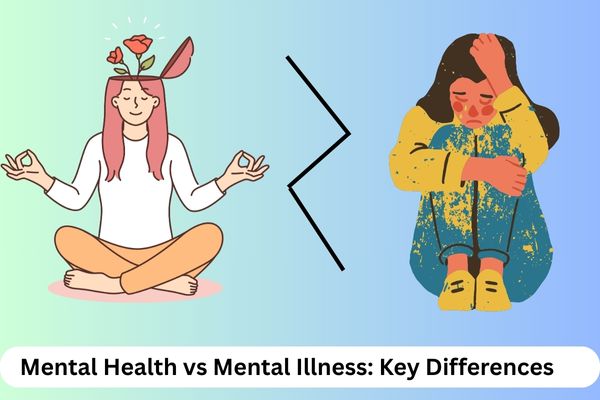Mental health and mental illness are related but not the same. Mental health refers to your emotional, psychological, and social well-being. It shapes how you think, feel, and behave in everyday life. Mental illness is a medical condition that disrupts your thoughts, emotions, or behavior, making it harder to function normally. Understanding the difference is essential for recognizing signs early, seeking proper help, and supporting overall well-being.
This article explains the key differences, clears common misconceptions, and shares practical ways to maintain a healthy mind while exploring mental health vs mental illness.
Understanding Mental Health
Mental health is your overall emotional, psychological, and social well-being. It affects how you think, feel, and behave in everyday situations. Good mental health helps you handle stress, build relationships, and make decisions effectively. It is not just the absence of illness but a state where you can function well, adapt to challenges, and enjoy life. Recognizing the importance of mental health is essential, as it influences every part of your daily living and long-term happiness.
Understanding Mental Illness
Mental illness is a medical condition that affects a person’s thinking, emotions, or behavior in ways that disrupt daily life. It can range from mild to severe and may be temporary or long-term. Common examples include depression, anxiety disorders, bipolar disorder, and schizophrenia. Mental illness often requires professional diagnosis and treatment to manage symptoms and improve quality of life.
What Is the Difference Between Mental Health and Mental Illness?
Mental health is your overall emotional, psychological, and social well-being, while mental illness is a diagnosed condition that disrupts thoughts, emotions, or behavior. The key difference is that everyone has mental health, but not everyone experiences a mental illness.
| Mental Health | Mental Illness |
| Mental health is the overall state of your emotional, psychological, and social well-being. | Mental illness is a diagnosable condition that affects your thoughts, emotions, or behavior. |
| Everyone has mental health, regardless of whether they have an illness. | Not everyone experiences a mental illness; it affects only a part of the population. |
| Mental health can range from good to poor, depending on various factors. | Mental illness always refers to a specific disorder that needs management or treatment. |
| Good mental health helps you cope with stress, maintain relationships, and make sound decisions. | Mental illness can disrupt daily life and make it challenging to handle everyday responsibilities. |
| Mental health is influenced by life experiences, environment, and biological factors. | Mental illness may be caused by genetic, biological, psychological, or environmental factors. |
| You can maintain mental health through self-care, healthy routines, and social support. | Managing mental illness often requires professional help, therapy, and sometimes medication. |
How People See Mental Health and Mental Illness?
Perceptions of mental health and mental illness have improved in recent years, but misconceptions still remain. Some people think mental health only matters when problems arise, while others see mental illness as a personal weakness rather than a medical condition. These beliefs can lead to stigma and prevent individuals from seeking the help they need.
Greater awareness and open conversations can change these views. When people understand that mental health is a vital part of overall well-being and that mental illness is treatable, they become more supportive and compassionate toward those experiencing challenges.
Ways to Improve Your Mental Health and Well-Being
You can improve your mental health and well-being by staying active, eating well, getting enough rest, and maintaining supportive relationships. Practicing mindfulness and seeking professional help when needed also play a key role.
1. Stay Physically Active
Regular physical activity releases endorphins, the “feel-good” chemicals in the brain. Exercise also reduces stress, boosts energy, and improves sleep quality. Even a short daily walk can make a difference.
2. Maintain Strong Social Connections
Spending time with friends, family, or supportive groups helps reduce feelings of loneliness and isolation. Positive relationships provide emotional support and a sense of belonging.
3. Practice Mindfulness and Relaxation
Mindfulness, meditation, and deep-breathing exercises help you stay present and manage stress. Setting aside just 10 minutes a day can improve focus and emotional balance.
4. Get Enough Rest
Quality sleep is vital for mental clarity, emotional stability, and decision-making. Aim for 7–9 hours of uninterrupted sleep each night to allow your brain to recharge.
5. Eat a Balanced Diet
Nutritious foods, rich in vitamins and minerals, support brain health and mood regulation. Include whole grains, fruits, vegetables, lean proteins, and healthy fats in your meals.
6. Seek Professional Help When Needed
If you are struggling with emotions, thoughts, or behaviors that affect daily life, don’t hesitate to speak with a counselor, psychologist, or psychiatrist. Professional guidance can make a significant difference in recovery and coping.
Conclusion
Understanding mental health vs mental illness is essential for promoting well-being, reducing stigma, and encouraging early intervention. While mental health refers to the state of your emotional, psychological, and social well-being, mental illness involves diagnosable conditions that can disrupt daily life. By learning the difference, challenging misconceptions, and taking proactive steps such as staying active, building strong connections, and seeking help when needed you can protect your mental health and support others on their journey toward recovery and resilience.
Frequently Asked Questions
Yes. Stress, burnout, or emotional struggles can lead to poor mental health even if you do not have a diagnosed mental illness.
Yes, with the right treatment, lifestyle habits, and support, people living with mental illness can still maintain good overall mental health.
Yes, mental illness is one aspect of mental health, but mental health also includes positive well-being and the ability to function effectively.
The common types of mental illness include depression, anxiety disorders, bipolar disorder, schizophrenia, post-traumatic stress disorder (PTSD), and obsessive-compulsive disorder (OCD).



